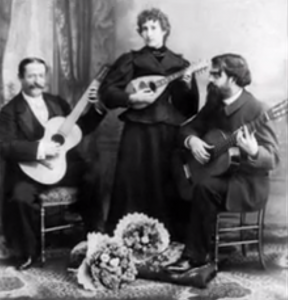
Came across this, purporting to be a wax cylinder recording of Tarrega, complete with some kind of commentary. Thanks to Jorge Orozco for putting this on Youtube.
Fascinating, and instructive … if genuine.
Huge crackle warning ….!


Came across this, purporting to be a wax cylinder recording of Tarrega, complete with some kind of commentary. Thanks to Jorge Orozco for putting this on Youtube.
Fascinating, and instructive … if genuine.
Huge crackle warning ….!
It is easy to forget that the great epics of classical Greek poetry were originally sung. Since the 16th century, scholars have been trying to reconstruct the songs of Sappho, Sophocles, Euripides and Homer from their signature poems.
Now research carried out by Armand d’Angour at Oxford University is bringing us several steps closer to hearing how this ancient music sounded.
Do you remember an Inn,
Miranda?
Do you remember an Inn?
And the tedding and the spreading
Of the straw for a bedding,
And the fleas that tease in the High Pyrenees,
And the wine that tasted of tar?
So begins Hilaire Belloc’s mysterious mini-epic, Tarantella.
This is a justifiably famous poem from the person who penned Cautionary Tales for Children. He was known as a writer, orator, poet, sailor, satirist, man of letters, soldier and political activist. Originally French, he became a naturalised British subject in 1922, and was President of the Oxford Union and later MP for Salford from 1906 to 1910.
He was famous for his vigorously disputative nature and running feuds with various other strong minded personalities. H.G.Wells remarked that “Debating Mr. Belloc is like arguing with a hailstorm“.
What is less well known is that he actually wrote a bit of music and sang to his poems, including Tarantella.
I was naturally excited to see the following instruction on the top of the page, which was presented to me by Pam Spooner, one of Betty Roe’s singing students (at the age of 85!) and the possessor of a fine high soprano voice.
 This month, Musical America’s 2013 Instrumentalist of the Year – Wu Man ??– gives the world premiere performances of a new pipa concerto by Chinese composer Zhao Jiping, accompanied by the Sydney Symphony Orchestra at the Sydney Opera House.
This month, Musical America’s 2013 Instrumentalist of the Year – Wu Man ??– gives the world premiere performances of a new pipa concerto by Chinese composer Zhao Jiping, accompanied by the Sydney Symphony Orchestra at the Sydney Opera House.
In this video, Wu Man talks about the new composition and demonstrates the exotic sounds of the pipa.
Just to get you in the mood for All Souls
Death makes an appearance in this work of Apostolos Paraskevas (Apostolos has written many works featuring the Grim Reaper, claiming that he is a guitarist.)
Alternatively, in a more classical vein, you could try any of the following: Continue reading
Featuring numbers with titles like “A light dry table wine”, “Gooseflesh”, “Bed and Desk”, and together with the overall title of the collection, you would be right in assuming that the pieces are lighthearterd duets, possibly inspired by student days together.
Twelve Silly Songs For Twelve Silly Strings is a collection of up-tempo, light-hearted jazz/swing tunes written by Randall Avers and Rami Vamos.
“lively, infectious… a good-time vibe”
FANFARE: Robert Schulslaper
“fun, clever and novel pieces–we love to play them!”
Laura Oltmann & Michael Newman
“irresistible and delightful duets”
Stephen Aron, Oberlin Conservatory and Akron University
“laugh-out-loud funny…. This collection is a treasure”
Matthew Hinsley, President of Austin Classical Guitar Society
“Silly Songs is guitar music which has the rare quality of sounding wonderfully familiar,whimsical and totally unique simultaneously”
Ben Verdery, Yale School of Music
Here is Bed and Desk
and Cricket from the collection, which shows the essentially off beat humour and lightly worn musicality inherent in these pieces.
 Another birthday – it was Ned Rorem’s 90th yesterday..
Another birthday – it was Ned Rorem’s 90th yesterday..
It’s an occasion that would be easy to miss. Apart from some concerts here and there, there has not been a fanfare, or any special mention in the media for this prolific American composer and Pulitzer Prize winner.
He became notorious for his diaries published from the 1950s and he is far better known in certain circles for his literary work than as a composer. As he put it to the Paris Review in 1999, his early diaries were “filled with drunkenness, sex, and the talk of my betters.”
In an interview with WYNC’s Sarah Fishko in 2002 he reminisces about his teacher who introduced him to the music of Debussy, Stravinsky and Ravel, and also pointedly adds
“I never go to classical concerts any more and I don’t know anyone who does. It’s hard still to care whether some virtuoso tonight will perform [Beethoven‘s] Moonlight Sonata a bit better or a bit worse than another virtuoso performed it last night.”
Here is the full article celebrating his achievements by ANASTASIA TSIOULCAS of NPR Classical.